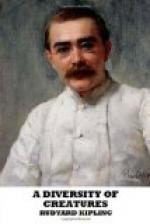‘Cassee,’ it repeated. ‘Che me rends. Le medicin! Toctor!’
‘Nein!’ said she, bringing all her small German to bear with the big pistol. ‘Ich haben der todt Kinder gesehn.’
The head was still. Mary’s hand dropped. She had been careful to keep her finger off the trigger for fear of accidents. After a few moments’ waiting, she returned to the destructor, where the flames were falling, and churned up Wynn’s charring books with the poker. Again the head groaned for the doctor.
‘Stop that!’ said Mary, and stamped her foot. ’Stop that, you bloody pagan!’
The words came quite smoothly and naturally. They were Wynn’s own words, and Wynn was a gentleman who for no consideration on earth would have torn little Edna into those vividly coloured strips and strings. But this thing hunched under the oak-tree had done that thing. It was no question of reading horrors out of newspapers to Miss Fowler. Mary had seen it with her own eyes on the ‘Royal Oak’ kitchen table. She must not allow her mind to dwell upon it. Now Wynn was dead, and everything connected with him was lumping and rustling and tinkling under her busy poker into red black dust and grey leaves of ash. The thing beneath the oak would die too. Mary had seen death more than once. She came of a family that had a knack of dying under, as she told Miss Fowler, ’most distressing circumstances.’ She would stay where she was till she was entirely satisfied that It was dead—dead as dear papa in the late ’eighties; aunt Mary in eighty-nine; mamma in ’ninety-one; cousin Dick in ninety-five; Lady McCausland’s housemaid in ’ninety-nine; Lady McCausland’s sister in nineteen hundred and one; Wynn buried five days ago; and Edna Gerritt still waiting for decent earth to hide her. As she thought—her underlip caught up by one faded canine, brows knit and nostrils wide—she wielded the poker with lunges that jarred the grating at the bottom, and careful scrapes round the brick-work above. She looked at her wrist-watch. It was getting on to half-past four, and the rain was coming down in earnest. Tea would be at five. If It did not die before that time, she would be soaked and would have to change. Meantime, and this occupied her, Wynn’s things were burning well in spite of the hissing wet, though now and again a book-back with a quite distinguishable title would be heaved up out of the mass. The exercise of stoking had given her a glow which seemed to reach to the marrow of her bones. She hummed—Mary never had a voice—to herself. She had never believed in all those advanced views—though Miss Fowler herself leaned a little that way—of woman’s work in the world; but now she saw there was much to be said for them. This, for instance, was her work—work which no man, least of all Dr. Hennis, would ever have done. A man, at such a crisis, would be what Wynn called a ‘sportsman’; would leave everything to fetch help, and would certainly bring It into the house. Now a woman’s business was to make a happy home for—for a husband and children. Failing these—it was not a thing one should allow one’s mind to dwell upon—but—




